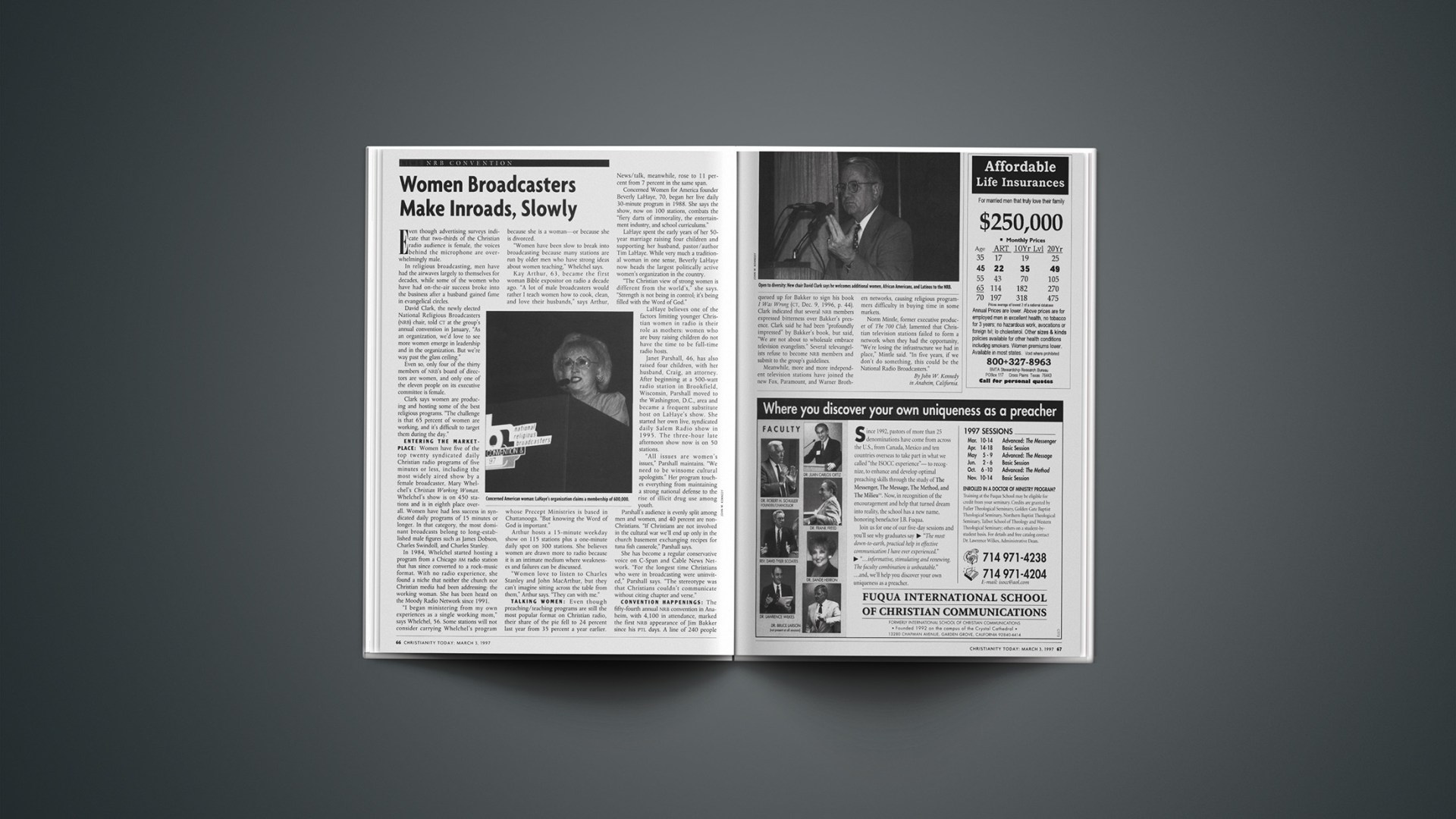Even though advertising surveys indicate that two-thirds of the Christian radio audience is female, the voices behind the microphone are overwhelmingly male.
In religious broadcasting, men have had the airwaves largely to themselves for decades, while some of the women who have had on-the-air success broke into the business after a husband gained fame in evangelical circles.
David Clark, the newly elected National Religious Broadcasters (NRB) chair, told CT at the group’s annual convention in January, “As an organization, we’d love to see more women emerge in leadership and in the organization. But we’re way past the glass ceiling.”
Even so, only four of the thirty members of NRB’s board of directors are women, and only one of the eleven people on its executive committee is female.
Clark says women are producing and hosting some of the best religious programs. “The challenge is that 65 percent of women are working, and it’s difficult to target them during the day.”
ENTERING THE MARKETPLACE: Women have five of the top twenty syndicated daily Christian radio programs of five minutes or less, including the most widely aired show by a female broadcaster, Mary Whelchel’s Christian Working Woman. Whelchel’s show is on 450 stations and is in eighth place overall. Women have had less success in syndicated daily programs of 15 minutes or longer. In that category, the most dominant broadcasts belong to long-established male figures such as James Dobson, Charles Swindoll, and Charles Stanley.
In 1984, Whelchel started hosting a program from a Chicago AM radio station that has since converted to a rock-music format. With no radio experience, she found a niche that neither the church nor Christian media had been addressing: the working woman. She has been heard on the Moody Radio Network since 1991.
“I began ministering from my own experiences as a single working mom,” says Whelchel, 56. Some stations will not consider carrying Whelchel’s program because she is a woman—or because she is divorced.
“Women have been slow to break into broadcasting because many stations are run by older men who have strong ideas about women teaching,” Whelchel says.
Kay Arthur, 63, became the first woman Bible expositor on radio a decade ago. “A lot of male broadcasters would rather I teach women how to cook, clean, and love their husbands,” says Arthur, whose Precept Ministries is based in Chattanooga. “But knowing the Word of God is important.”
Arthur hosts a 15-minute weekday show on 115 stations plus a one-minute daily spot on 300 stations. She believes women are drawn more to radio because it is an intimate medium where weaknesses and failures can be discussed.
“Women love to listen to Charles Stanley and John MacArthur, but they can’t imagine sitting across the table from them,” Arthur says. “They can with me.”
TALKING WOMEN: Even though preaching/teaching programs are still the most popular format on Christian radio, their share of the pie fell to 24 percent last year from 35 percent a year earlier. News/talk, meanwhile, rose to 11 percent from 7 percent in the same span.
Concerned Women for America founder Beverly LaHaye, 70, began her live daily 30-minute program in 1988. She says the show, now on 100 stations, combats the “fiery darts of immorality, the entertainment industry, and school curriculums.”
LaHaye spent the early years of her 50-year marriage raising four children and supporting her husband, pastor/author Tim LaHaye. While very much a traditional woman in one sense, Beverly LaHaye now heads the largest politically active women’s organization in the country.
“The Christian view of strong women is different from the world’s,” she says. “Strength is not being in control; it’s being filled with the Word of God.”
LaHaye believes one of the factors limiting younger Christian women in radio is their role as mothers: women who are busy raising children do not have the time to be full-time radio hosts.
Janet Parshall, 46, has also raised four children, with her husband, Craig, an attorney. After beginning at a 500-watt radio station in Brookfield, Wisconsin, Parshall moved to the Washington, D.C., area and became a frequent substitute host on LaHaye’s show. She started her own live, syndicated daily Salem Radio show in 1995. The three-hour late afternoon show now is on 50 stations.
“All issues are women’s issues,” Parshall maintains. “We need to be winsome cultural apologists.” Her program touches everything from maintaining a strong national defense to the rise of illicit drug use among youth.
Parshall’s audience is evenly split among men and women, and 40 percent are non-Christians. “If Christians are not involved in the cultural war we’ll end up only in the church basement exchanging recipes for tuna fish casserole,” Parshall says.
She has become a regular conservative voice on C-Span and Cable News Network. “For the longest time Christians who were in broadcasting were uninvited,” Parshall says. “The stereotype was that Christians couldn’t communicate without citing chapter and verse.”
CONVENTION HAPPENINGS: The fifty-fourth annual nrb convention in Anaheim, with 4,100 in attendance, marked the first nrb appearance of Jim Bakker since his ptl days. A line of 240 people queued up for Bakker to sign his book I Was Wrong (CT, Dec. 9, 1996, p. 44). Clark indicated that several NRB members expressed bitterness over Bakker’s presence. Clark said he had been “profoundly impressed” by Bakker’s book, but said, “We are not about to wholesale embrace television evangelists.” Several televangelists refuse to become NRB members and submit to the group’s guidelines.
Meanwhile, more and more independent television stations have joined the new Fox, Paramount, and Warner Brothers networks, causing religious programmers difficulty in buying time in some markets.
Norm Mintle, former executive producer of The 700 Club, lamented that Christian television stations failed to form a network when they had the opportunity, “We’re losing the infrastructure we had in place,” Mintle said. “In five years, if we don’t do something, this could be the National Radio Broadcasters.”
Copyright © 1997 Christianity Today. Click for reprint information.










